Online courses aren’t just a great way to monetize your skills and your content, but they’re also becoming more in demand in this new era of social distancing and remote working.
As an online course creator, you can help hundreds of people learn the skills they need to enter a new profession, learn a new hobby, or expand their capabilities. Plus, once you’ve published your course, you can start earning a passive income almost immediately!
However, that’s not to say developing a course is easy. Creating a course that people want to pay for takes more than uploading videos — the best online courses feature thoughtfully designed curriculums and assignments, community groups, and easy-to-access resources. But it can be tricky to host an online course without any extra support.
That’s where online course platforms come in. Online course platforms are awesome for streamlining the whole course creation and e-learning process. Not to mention that most platforms actively support your course by giving your students access to learning communities, keeping your resources easy to access, and (sometimes) hosting live webinars for your students.
Before you check out the best online course platforms and learning management systems (or LMSs) on the market in 2021, the main thing you need to consider is how much support you need with your business.
Some platforms offer an all-in-one service, giving you access to a course website builder, marketing support, reporting tools, sales page builders, and even community tools alongside course builders. These features are great if you don’t have much experience with building courses, but they can be on the expensive side.
However, if you’re happy to DIY your online course business, plenty of other platforms offer simpler online course builders. Many will offer integrations with third-party platforms, so you can use your choice of website builder or marketing suite, while others will enter your course into a marketplace for the platform’s customers to buy.
Both platform types have their advantages and disadvantages, so make sure you check out all of the online course platforms below to find which one works best for you.
The best online course platforms in 2021
Here are 12 great places to create and sell your online courses.
1. Skillshare
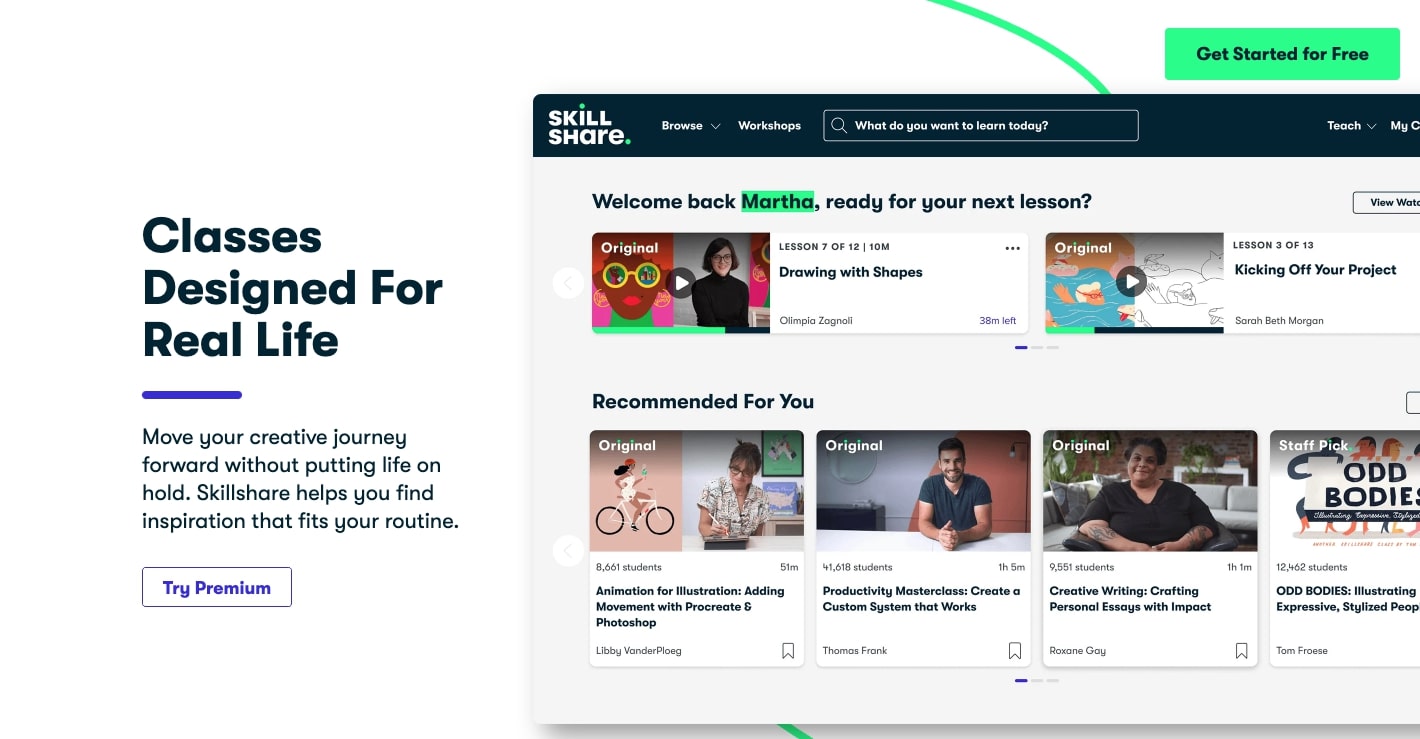
- Pricing: Free
- Transaction Fees: None
- Earning Model: Royalties and referrals
- Platforms: Web, Android, iOS
Skillshare is the best-known online course platform — and that’s not just because they sponsor several YouTubers. With a massive range of different courses and teachers sharing their knowledge, Skillshare is super popular with anyone looking to learn a new skill or break into a new career.
If you’re looking to break into creating online courses, Skillshare is a great place to start. Because Skillshare is a subscription-based platform, you don’t have to worry about pricing your course as you’ll get paid royalties based on your course enrollment and how many e-learning students you refer to Skillshare. When you’re just getting started with creating a course and marketing it to potential students, not having to worry about pricing is a relief.
With Skillshare, you’ll create a “class,” or a video course, that lasts up to 60 minutes paired with an assignment. You can also engage with your students through a community portal, so it’s easy to help people out, give feedback on student assignments, and start building an audience for your courses. All in all, Skillshare is one of the best platforms for learning experience as the discussion forums and automation of student communication mean all your students get the high-quality support they need.
It’s worth noting, however, that you need to have at least 25 students enrolled in your course to be able to earn royalties from it — and those students have to be paying for Skillshare’s premium subscription. So, while Skillshare is a good way to earn some passive income and learn how to create courses, it’s not the most lucrative platform unless you have a significant following.
2. Teachable

- Pricing: $29–$249/month
- Transaction Fees: Up to 5%
- Earning Model: Sales (courses)
- Platforms: Web, iOS
Teachable is one of the best online learning platforms because it gives you a ton of control over how your courses are designed and, most importantly, how they’re priced. It’s one of the most comprehensive course creators out there, and it comes with lots of features to help you get started with creating online courses — and profit from them.
Plus, with payment plans starting at $29 per month with a 5% transaction fee, it’s affordable to get started without breaking the bank. The next tier up at $99 per month is worth grabbing if you’ve got a bigger budget because you get several more features and no transaction fees.
Regardless of the plan you choose, Teachable offers instant payouts, hundreds of third-party integrations, email marketing support, the ability to create unlimited courses, and access to a bunch of learning materials to help accelerate your profits. Teachable is unique in that it doesn’t just offer courses, either — all e-learning course creators can set up coaching sessions through the platform to engage your students and, of course, earn extra income from your coaching.
When you’re ready to upgrade to Teachable’s pro plan, you’ll also get to improve your courses with graded quizzes and completion certificates, and you’ll be able to market your own courses with an unbranded Teachable portal. You can even get your students to market your courses for you with your own affiliate program.
3. Kajabi
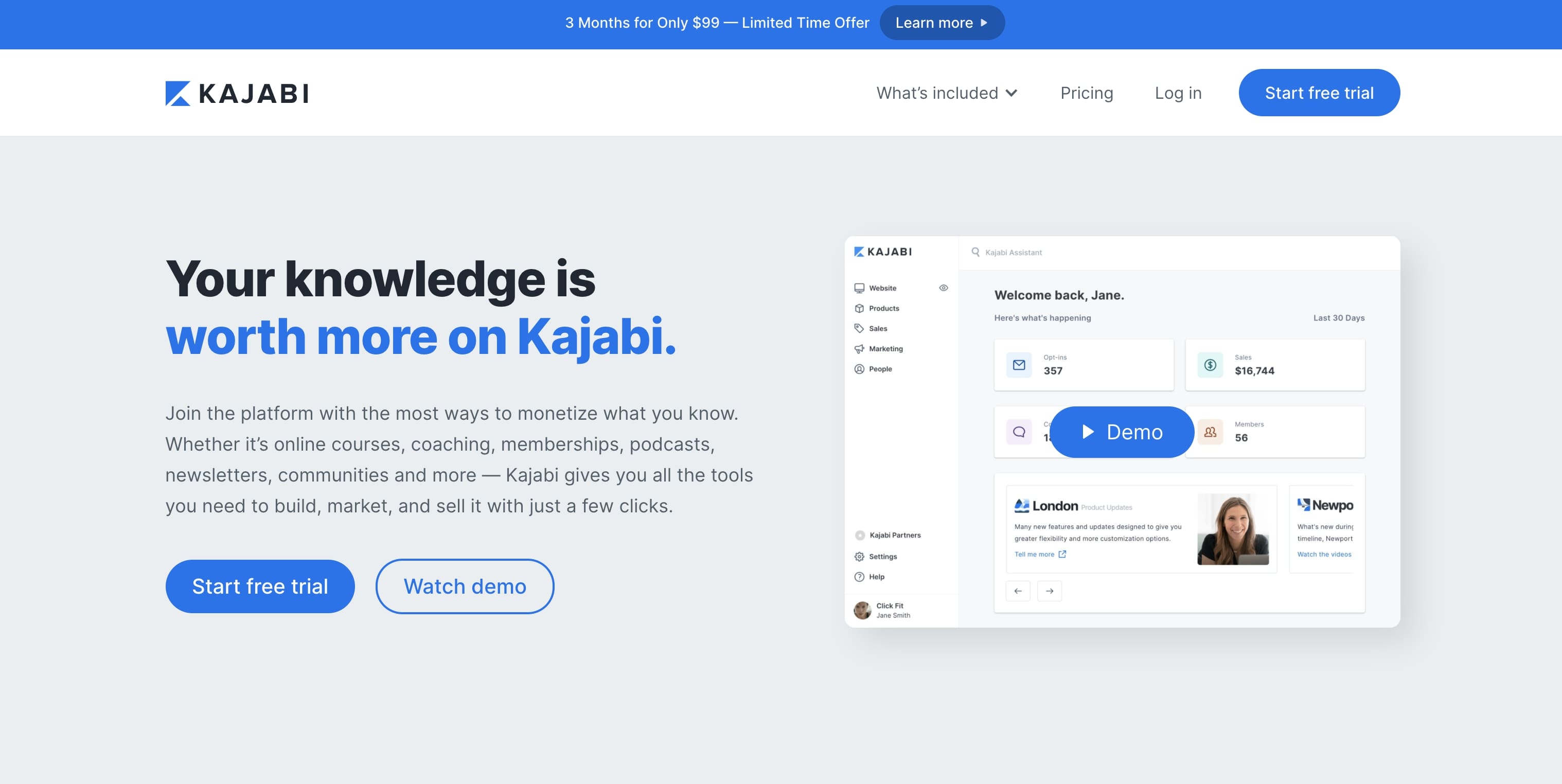
- Pricing: $149–$399/month
- Transaction Fees: None
- Earning Model: Sales (courses and coaching)
- Platforms: Web, Android, iOS
Kajabi is a brilliant all-in-one course creation platform that covers pretty much everything you need. Not only do you get a ton of tools for creating your online courses, but Kajabi helps you design workflows to generate leads and market your courses, run webinars, and manage your email marketing. This platform even offers a mobile app so your students can participate in your online classes wherever they are.
While their monthly fees start at $149 per month, which is a significant cost for newbie course creators, Kajabi offers everything you’ll ever need to start monetizing your online courses.
Even on the lowest pricing tier, you get access to more than 10 different course templates, as well as course player customization options to make the platform your own. You also get powerful engagement tools like community management, graded quizzes and assessments, and even the ability to run a blog to help keep your students active. Plus, with access to Kajabi University, you’ll get all the support you need to start profiting from your online courses.
4. Podia
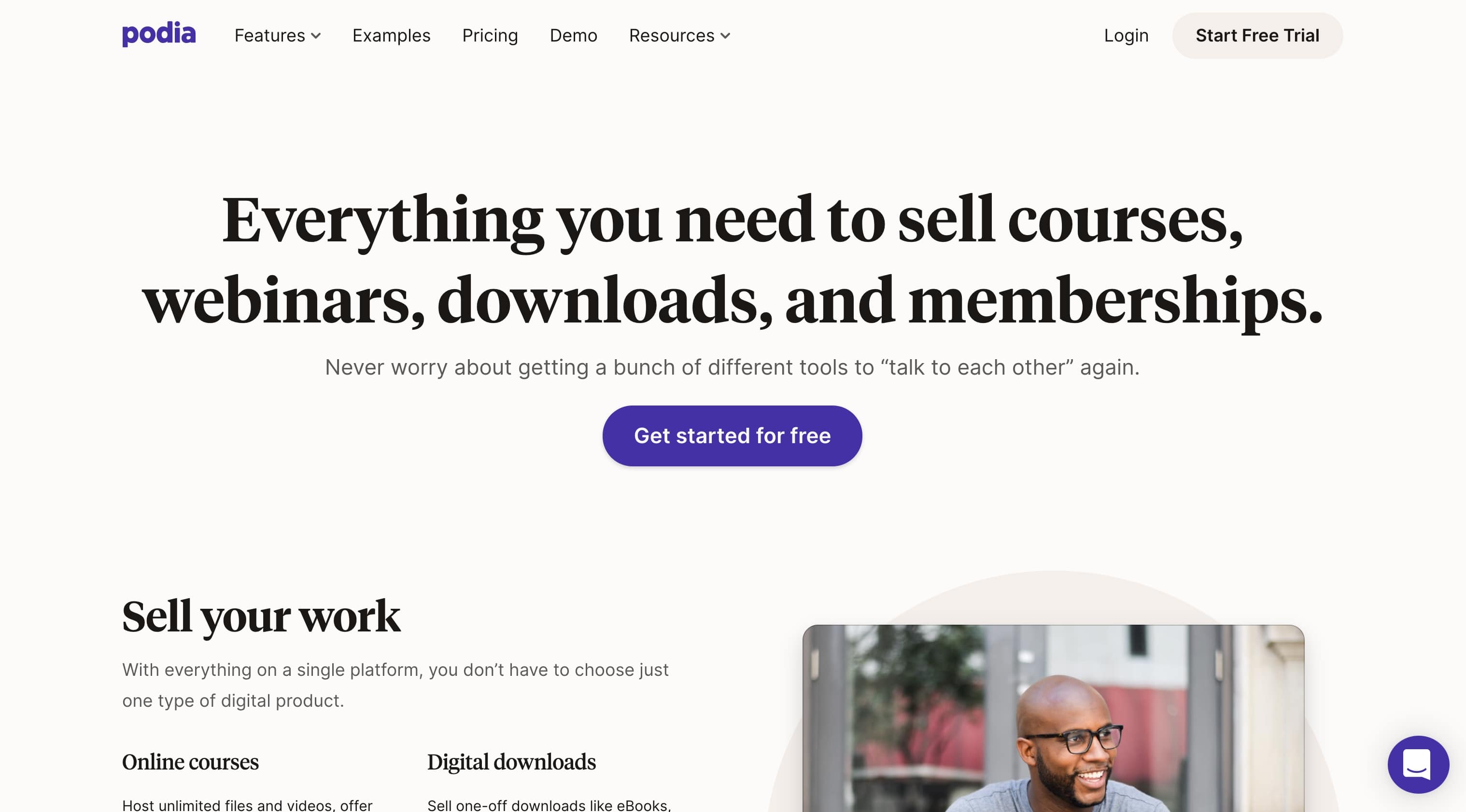
- Pricing: $39–$149/month
- Transaction Fees: None
- Earning Model: Sales (courses, downloads, memberships, webinars)
- Platforms: Web
If an all-in-one online course platform sounds good, but your budget can’t stretch to more expensive platforms, then you’ll love Podia. For only $39 per month with zero platform fees, you get a suite of features that helps you manage your digital content store, create courses, and sell memberships and digital downloads.
Podia offers a lot of customization in how you design and release your courses, too. Once you’ve created a course, you can choose to launch it immediately, set up crowdfunding or presales, release individual sections on a set schedule, or even sell your courses in a bundle.
Plus, Podia offers you a massive range of marketing tools, like email marketing, sales funnels, landing page builders, a fully optimized checkout page, a customizable website with custom URL support, and more. You can even offer your students payment plans through Podia, making it even easier to convert visitors into customers.
Podia is a great all-in-one platform for selling courses, particularly if you need your own website. With integration with your email lists through platforms like Mailchimp, and even support for affiliate marketing, this e-learning platform is a great contender for the best online course platform.
5. Thinkific

- Pricing: Free to $399/month
- Transaction Fees: None
- Earning Model: Sales (courses and memberships)
- Platforms: Web
Thinkific is another fantastic all-in-one LMS that helps you build courses, market them, and build a community around your work. Not only that, but one of the standout features of Thinkific is that you can offer your courses for either a one-time payment or make them accessible only for subscribing students. Plus, Thinkific makes it easy to create mini-courses that you can offer as digital products or free courses as lead magnets.
With all plans, you can offer free trials of your courses, accept multiple payment methods over different currencies, build custom landing pages and a custom website, and optimize all your courses for mobile and tablet learning. Plus, if you ever need help, you can easily access customer support via email or over the phone.
While there is a free plan in Thinkific’s pricing options, it’s extremely limited in its functionality. The basic plan starts at $49 per month and offers a ton more features, so if you’ve got even a small budget to play with, it’s best to start out with a basic plan or above. This will get you several more features, such as custom domains for your website, scheduled content releases, integration with other marketing software, and the ability to schedule start dates on your courses.
6. Udemy

- Pricing: Free
- Transaction Fees: None, but revenue is shared with Udemy
- Earning Model: Sales (courses)
- Platforms: Web, Android, iOS
Udemy is one of the first online teaching platforms, and it’s almost become a household name for anyone looking to take an online course. While it’s still a great platform for teaching online, it doesn’t offer the same amount of independence as some other platforms featured on this list.
The main reason for this is that while it’s free to create courses and teach using Udemy, they can take a significant cut from your course income. If students find and purchase your course through a direct link or an instructor coupon, you get to keep 97% of the course revenue. However, if they find your course through the Udemy marketplace or an ad, you only get 37% of the course revenue.
Saying that, Udemy isn’t a bad option if you’re new to teaching online courses. You get plenty of support with marketing, and Udemy will even show you how popular certain topics are, how much certain topics earn on average, and even the best promotional avenue for your course. Plus, as a teacher on Udemy, you benefit from having your course on one of the most popular online course marketplaces, which can be a great way to start making a name in online courses.



















Build websites that get results.
Build visually, publish instantly, and scale safely and quickly — without writing a line of code. All with Webflow's website experience platform.
7. Teachery
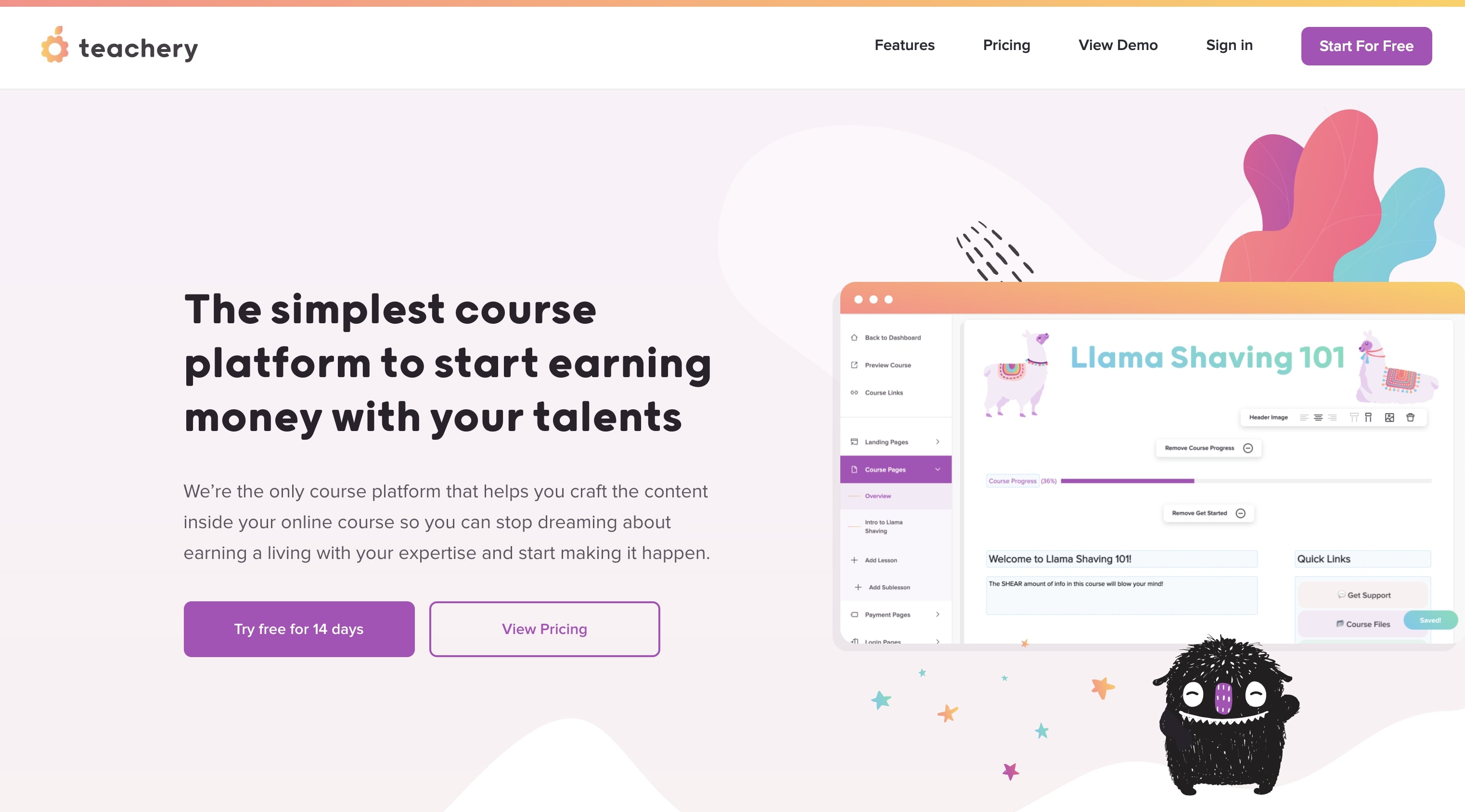
- Pricing: $49/month or $470/year
- Transaction Fees: None
- Earning Model: Sales (courses and memberships)
- Platforms: Web
If you’ve already got a website set up and you just want a platform that offers online course creation with scheduling tools, payment options, and simple email marketing, then Teachery might just be for you.
Teachery is one of the newer platforms on the market, but it’s certainly one of the best online course platforms around. Unlike some other platforms, Teachery prides itself on being a simple, no-nonsense platform for online creators. They don’t offer multiple tiers of service but rather offer all their features for $49 per month, which is extremely competitive compared to other platforms.
Saying that, though, Teachery is not as feature rich as some other platforms. While it does allow you to create an unlimited number of courses, all of which can be fully customized and released either in a single upload or on a schedule, there are only two course templates you can choose from. Plus, Teachery doesn’t host any course content through their platform and only allows you to embed videos, quizzes, or slideshow presentations.
It’s still a good online course platform and offers almost everything that course creators will need to get started. And, for $49 per month, the features it does have still rival the features you get from some other course platforms at the same price. However, it’s still fairly simple, and you might quickly outgrow Teachery.
8. Coursera

- Pricing: Free with paid plans available
- Transaction Fees: None
- Earning Model: Sales (courses)
- Platforms: Web, Android, iOS
Coursera is slightly different from the platforms featured so far. Coursera is an online course platform that focuses entirely on providing students with courses from colleges and universities, so to teach on Coursera, you need to sign up through Coursera for Campus. You also need to be a teacher affiliated with an educational institution, as Coursera’s courses are designed to help students earn honors credit and to support their curriculum.
What makes Coursera different is that it offers plagiarism flagging through peer review and plagiarism tracking through Gradebook, which is fantastic for educators. And, if your organization pays for Coursera for Campus, you can also get plagiarism detection supported by Turnitin.
9. LearnWorlds
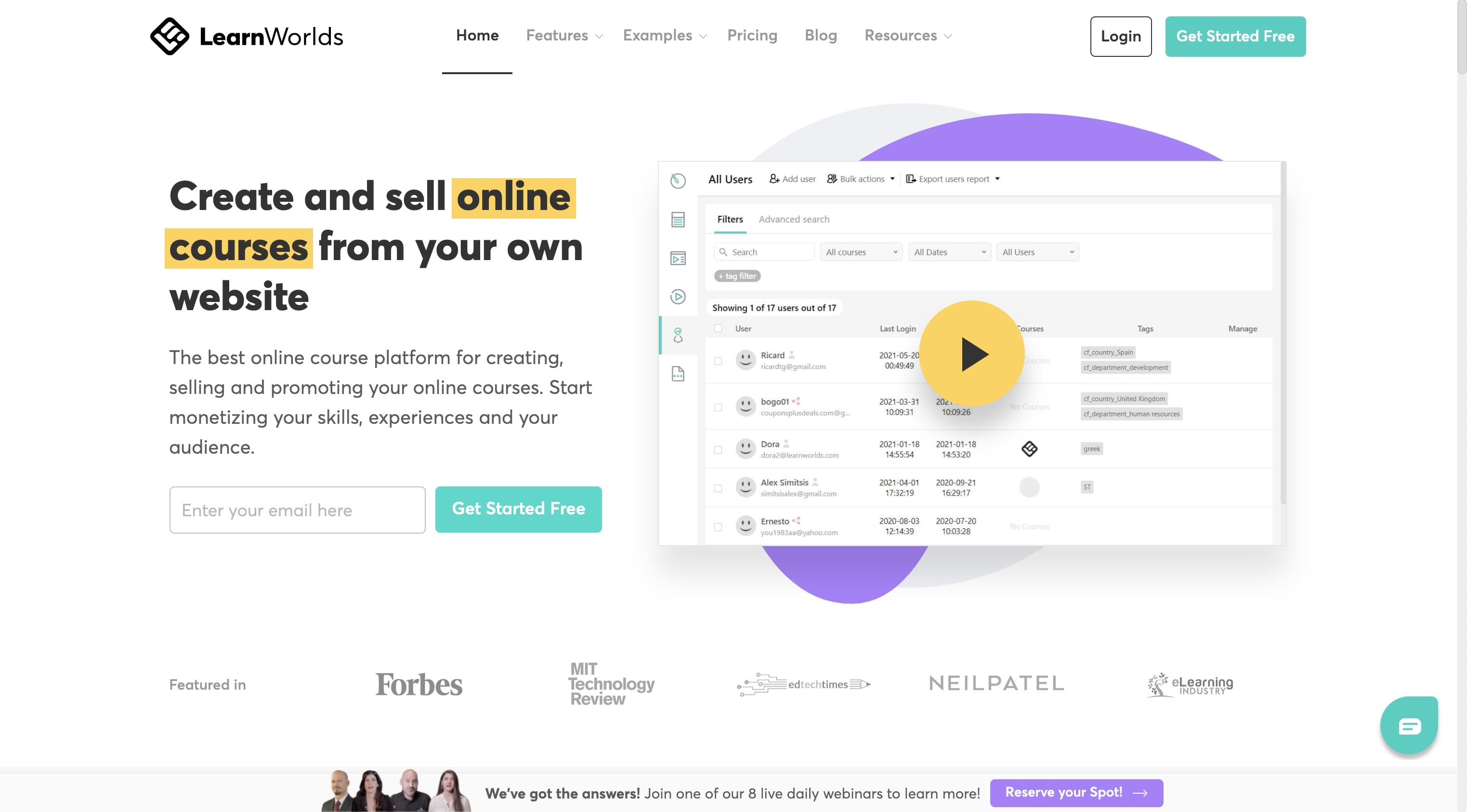
- Pricing: $29–$299/month
- Transaction Fees: $5 per course sale on the starter plan
- Earning Model: Sales (courses, subscriptions, memberships)
- Platforms: Web, Android, iOS
LearnWorlds is more than just an online course platform. It helps you to build an online school so you can offer as many courses as you like, build a community for your students, and even have a branded app for your courses.
While the starter plan does charge a transaction fee of $5 per course sale, you get a ton of features that most platforms will charge at least double for. With all plans, you get a custom domain for your website, a site builder, unlimited courses, five different payment gateways, and the ability to schedule course segment releases.
LearnWorlds even offers automatic transcripts of your videos, making your courses more accessible for all students. Plus, LearnWorlds also has a video editor, so you can add interactions, overlays, and links into your video content without having to spend a ton of time in postproduction.
10. Ruzuku
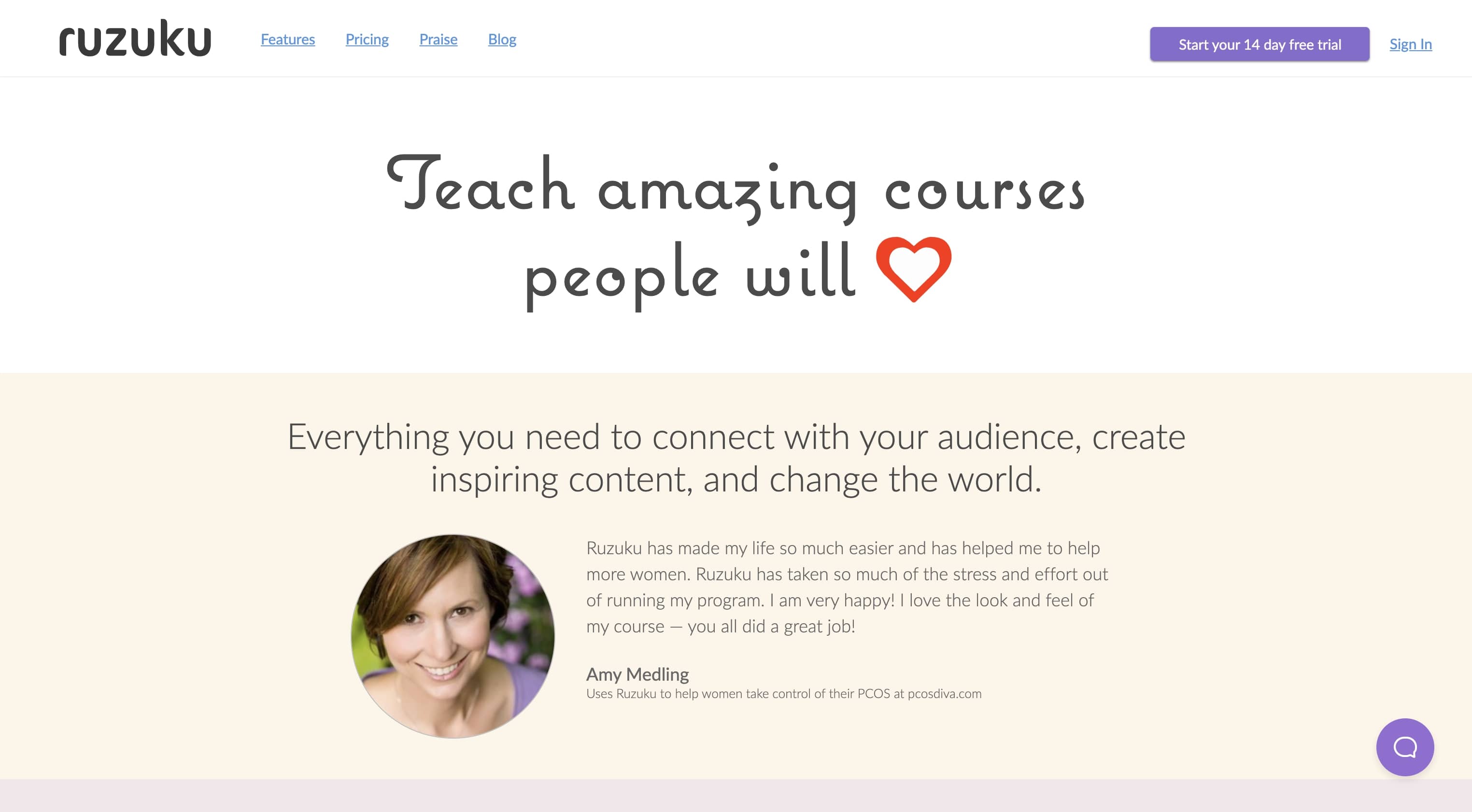
- Pricing: $74.75–$125/month
- Transaction Fees: None
- Earning Model: Sales (courses, webinars, subscriptions)
- Platforms: Web
If you’re a marketing whiz and you only need your chosen platform to host your courses stress-free, then Ruzuku has you covered. While their plans start at a relatively high cost, you get several features, including unlimited courses, unlimited data storage, lightning-fast hosting, daily backups, and integrated ecommerce.
When you teach on Ruzuku, you also get access to a bunch of training courses and tutorials to help you improve, as well as an intuitive dashboard that shows how your students are doing. Plus, you get to offer your students an online community where they can support each other, ask you questions, and post their work to get feedback.
11. Pathwright
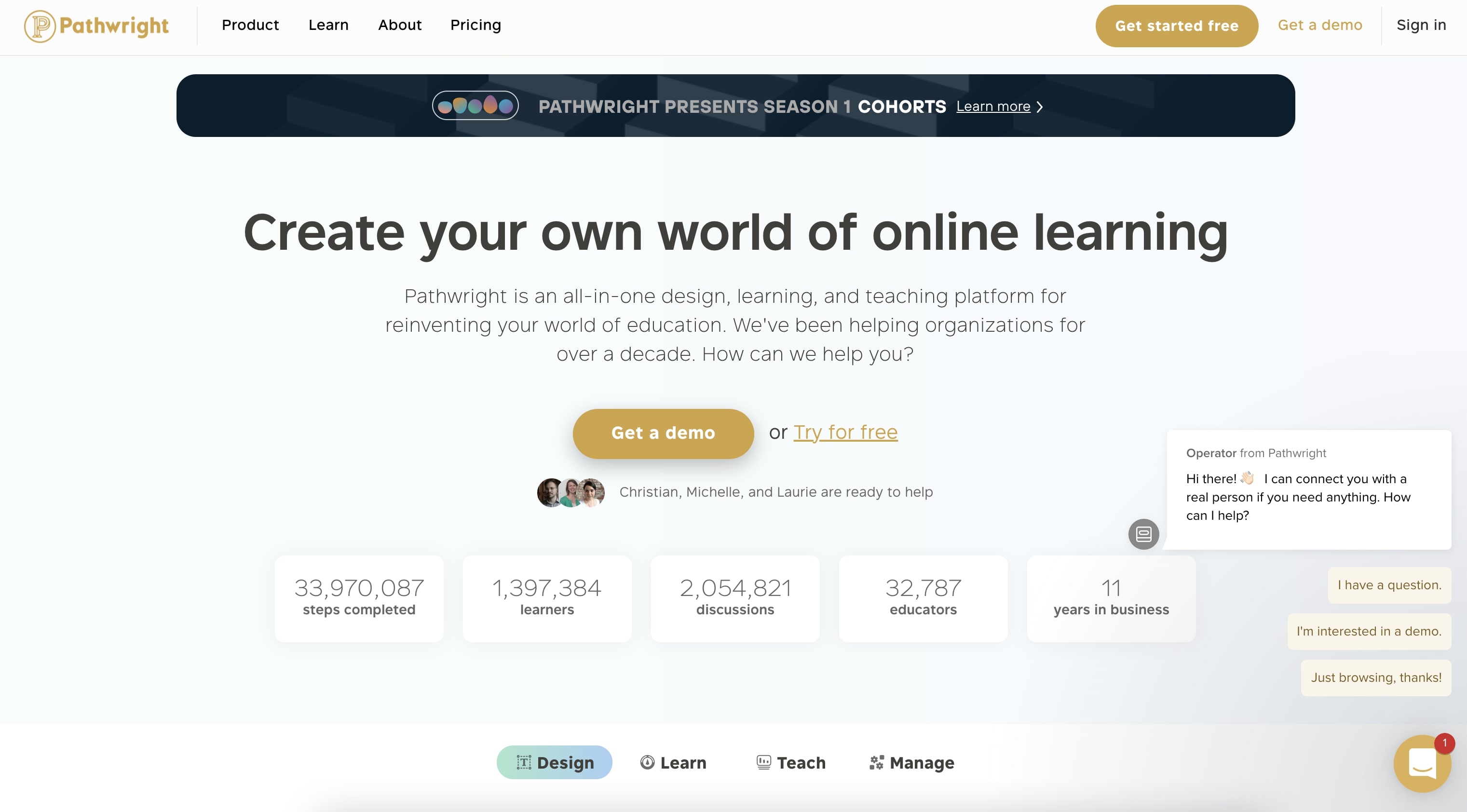
- Pricing: $99–$499/month
- Transaction Fees: None
- Earning Model: Sales (courses and subscriptions)
- Platforms: Web
Pathwright is a flexible online course platform that allows you to designate a hybrid curriculum of things your students need to work on at each stage of the course. At each step, you can designate both required and optional tasks, like things they need to read, listen to, watch, or submit for them to move on to the next part of your course.
As a teacher with Pathwright, you can create actionable courses with additional support like scheduling due dates, sending reminders to students, and participating in real-time class discussions. It’s also easy to see how your students are progressing and how your course is performing through your dashboard.
Pathwright gives you a lot of flexibility in how you earn an income from your courses. While they don’t offer PayPal integration, and the only payment portal they use is Stripe, you can easily set up a course at any price point.
12. Mighty Networks
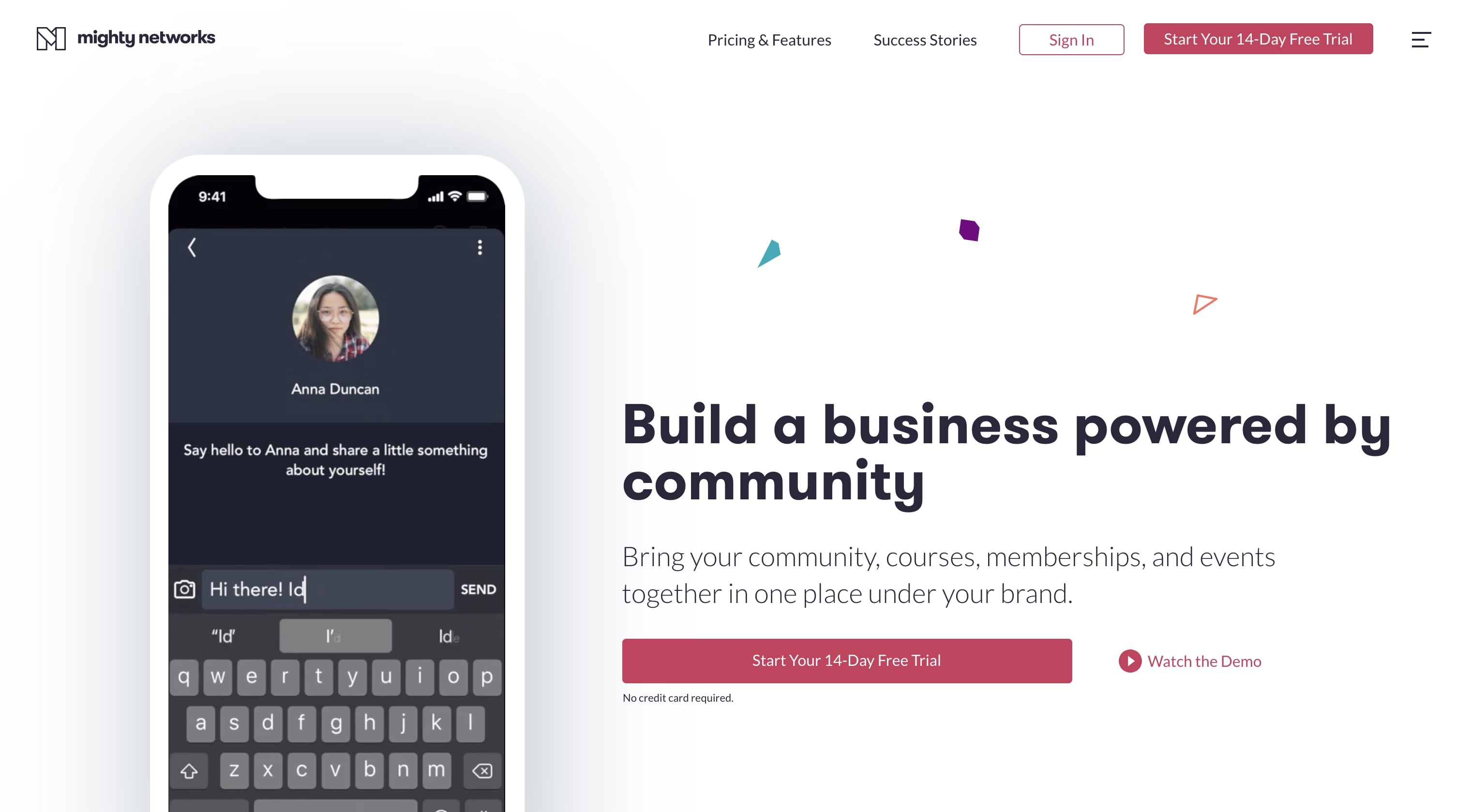
- Pricing: $98/month
- Transaction Fees: 2%
- Earning Model: Sales (courses and subscriptions)
- Platforms: Web, Android, iOS
Mighty Networks is a platform for building, as the name suggests, an online community for customers, students, or other community interests. While you can make a Mighty Networks community for $28 per month, if you want to create and publish online courses, you’ll need to pay for their business plan.
With Mighty Networks, you can create and sell online courses either individually or as a bundle, and you can either charge per course or charge subscriptions. Because this platform is so community-focused, you also get a whole suite of community tools, including the ability to fully customize how your course is presented. If you want an alternative to social media groups to support your video lessons, then this user-friendly platform is a good one to consider.
The course creator is really easy to use and is designed to work in tandem with community features, making Mighty Networks a good option for creators who want to build a network of followers or a membership site with downloadable content. However, if you’ve already got some experience with creating courses and you want to expand, or you want to be able to optimize your revenue, Mighty Networks might be too simplistic for you.
Market your online courses with Webflow
When you’re looking at creating and marketing your online courses, one of the most important things you need to get right is your website. Your website is what makes you stand out from the competition, and it’s where you get the chance to showcase your knowledge and help potential students understand whether they’re interested in learning from you.
With Webflow, you can create stunning websites to promote your online courses in only a few clicks. It’s easy to build a fully customized website without needing any coding knowledge, and if you want to get started even faster, we offer a library of templates to choose from to get your business up and running.
To learn more about how Webflow can help take your online courses to the next level, check out all the awesome things that businesses like yours have achieved with Webflow.































